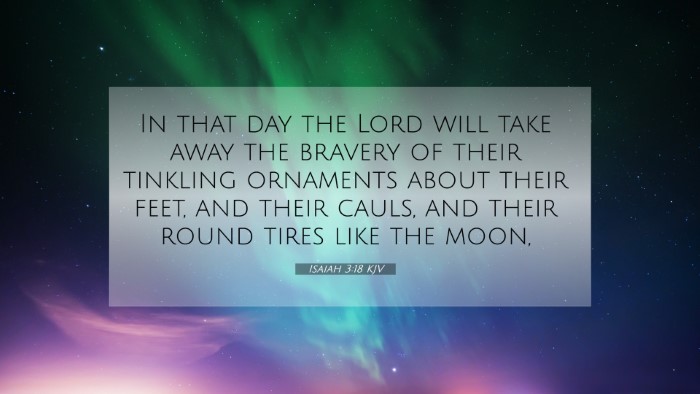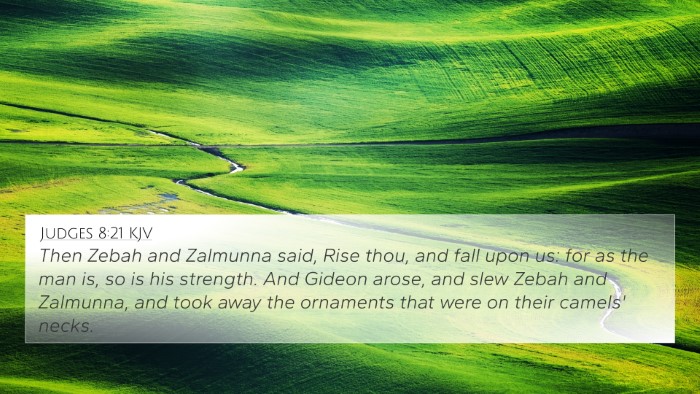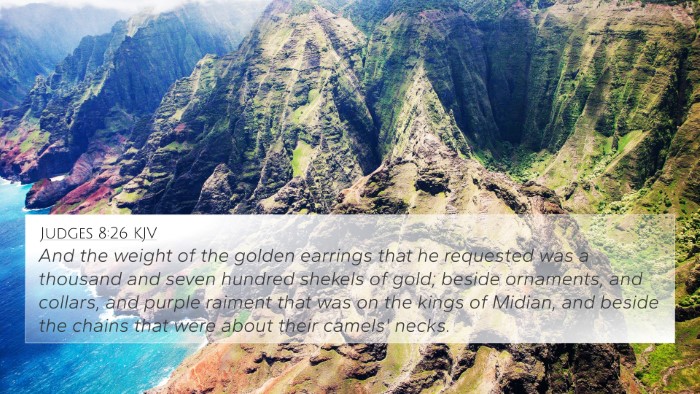Understanding Isaiah 3:18
Verse: Isaiah 3:18
This verse encompasses prophetic imagery describing the judgment that God enacts on the people of Judah and Jerusalem. It serves as a warning regarding the consequences of their transgressions.
Meaning and Interpretation
Isaiah 3:18 reads:
"In that day the Lord will take away the finery of the anklets, the headbands, and the crescents,"
This passage highlights the theme of divine judgment focused on the excesses and pride of the people. The details in this verse point towards the lavish adornments that signify status and vanity, which the Lord indicates He will remove as a form of chastisement.
Commentary Insights
Matthew Henry: Henry notes that the ornaments mentioned symbolize the outward vanity of the women of Jerusalem, who put their trust in beauty rather than godliness. The removal of these ornaments represents a stripping away of both physical and spiritual pride.
Albert Barnes: Barnes explains that this passage serves as a figurative expression of God’s judgment, removing the luxuries that have led the inhabitants away from humility and dependence on Him. The focus on these 'finery' items symbolizes a deeper spiritual bankruptcy.
Adam Clarke: Clarke interprets the finery referenced in this verse as a representation of false security. He posits that this will result in the people being faced with their own vulnerabilities and a realization that true beauty and worth lie in faithfulness to God, rather than external appearances.
Related Cross-References
This verse connects closely with several other passages that explore similar themes of vanity, judgment, and divine consequence:
- Isaiah 2:22 - "Stop regarding man in whose nostrils is breath, for of what account is he?"
- 1 Peter 3:3-4 - "Do not let your adorning be external—the braiding of hair and the putting on of gold jewelry, or the clothing you wear—but let your adorning be the hidden person of the heart..."
- Jeremiah 4:30 - "And you, O desolate one, what will you do? Though you dress in scarlet, though you adorn yourself with ornaments of gold..."
- Luke 12:27 - "Consider the lilies, how they grow: they neither toil nor spin, yet I tell you, even Solomon in all his glory was not arrayed like one of these."
- James 2:2-3 - “If a man wearing a gold ring and fine clothing comes into your assembly, and a poor man in shabby clothing also comes in...”
- Proverbs 31:30 - "Charm is deceitful, and beauty is vain, but a woman who fears the Lord is to be praised."
- Isaiah 1:18 - "Come now, let us reason together, says the Lord: though your sins are like scarlet, they shall be as white as snow..."
Thematic Connections
The overarching narrative weaving through Isaiah 3:18 is one of God stripping away the things that people find security in so that they may return to a humble reliance on Him. This forms part of a broader biblical context addressing:
- The theme of pride and humility
- Judgment and restoration
- External versus internal beauty
- God's call to repentance
- Hope amidst judgment
Conclusion
In summary, Isaiah 3:18 serves as a powerful reminder of the transient nature of material possessions and the importance of a heart aligned with God's values. The commentaries from Henry, Barnes, and Clarke emphasize the necessity of inner virtue over outward appearances, urging believers to examine their sources of security. As one pursues deeper insights into Scripture, cross-referencing this verse with related passages can unveil rich thematic dialogues throughout the Bible.
Using Bible Cross-References
For those seeking to study the Bible more comprehensively, tools for Bible cross-referencing are invaluable:
- Bible concordance
- Bible cross-reference guide
- Cross-reference Bible study methods
- Identifying connections between the Old and New Testament
- How to find cross-references in the Bible
- Bible references resources for deeper understanding
These resources enable a more enriching Bible study experience, allowing one to appreciate the inter-Biblical dialogue and the intricate tapestry of God's message throughout Scripture.




